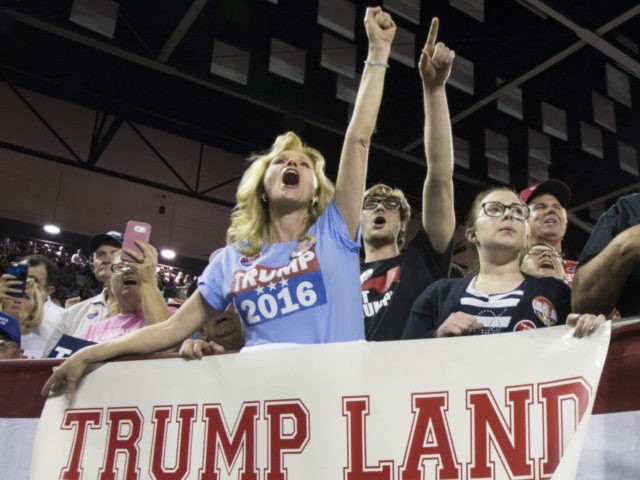Donald Trump may be on the path to a landslide re-election win in 2020.
Each of the three election models used by Moody’s Analytics to forecast the 2020 election indicates that Donald Trump will likely win the presidential contest. Under two of the models, Trump is forecast to win with more than the 304 electoral college votes he garnered in 2016.
“Under the average of the three models, Trump would hold on to key industrial Midwest states and pick up New Hampshire, Virginia and Minnesota,” Moody’s said in a report detailing the results of its models.
Moody’s election forecasts have been very reliable in the past, correctly predicting every election result except 2016. The model undercounted support for Trump because it did not anticipate the increase in voter turnout that shifted the majority vote in crucial states.
Importantly, Moody’s models all predict Trump wins even if the economy dips to multiyear lows by the end of 2020 and the stock market crashes 9 percent. In other words, Trump is expected to win despite a falling stock market and a sagging economy.
Moody’s “pocketbook” model looks at three variables: gasoline prices, home prices, and changes in real personal income. Voters tend to see higher gasoline prices as negative, higher home prices, and incomes as positive. Moody’s uses its economic models to predict how these variables will perform in the months leading up to the election.
“Under the baseline economic forecasts, the pocketbook model projects the most favorable outcome for Trump. If voters were to vote primarily on the basis of their pocketbooks, the president would steamroll the competition, taking home 351 electoral votes to the Democrats’ 187, assuming average voter turnout,” Moody’s explains.
Trump does worse under Moody’s “stock market” model, in large part because of the firm’s prediction that the S&P 500 will decline 9 percent between now and election day. Still Trump wins in this model with 289 electoral college votes.
“The Moody’s Analytics baseline forecast calls for annualized growth in U.S. real GDP to dip to multiyear lows by the end of next
year. Because of this growth slowdown, our baseline forecast calls for the richly valued S&P 500 to decline 9% between now and
Election Day. This weighs against Trump, but not enough for Democrats to unseat him,” Moody’s writes.
Even a much steeper decline of 12 percent would result only in a “nail-biting win” for Democrats with 279 electoral votes, compared with Republicans’ 259, Moody’s said.
The third model is based largely on the unemployment rate. But even rising unemployment just before the election would not be enough to cost Trump the election, according to the model.
“The baseline forecast for the unemployment rate across most states is for it to remain near current lows through the first half of next year, before ticking upward amid the growth slowdown. As a result, the unemployment model is not nearly as favorable to the president as the pocketbook model, but nevertheless does project a comfortable Trump victory of 332 electoral votes to 206, assuming average voter turnout,” Moody’s explains.
Turnout could play a big role in the election. If turnout by Democrats and independents voting against Trump is low to average, Trump easily wins under the models. If it climbs to the historical maximum, Trump would lose under the stock market and unemployment models but still win in the pocketbook model.

COMMENTS
Please let us know if you're having issues with commenting.